Learn how to raise internally motivated children, that enjoy helping with the chores with this list of 15 ways to raise a helper.
Try these simple parenting tips to get kids to help with chores around the house and garden. Young children love to feel useful and naturally enjoy helping with the chores because they don’t even realize that it’s work yet! All they want is to do what you are doing–let them!
Allowing young children to help with chores, even when it makes it harder for us, encourages this aspect of their nature. And, conversely, we eliminate this natural tendency when we discourage kids from assisting with household chores and duties. Children see us working, and they want to be like us. So why not capitalize on this natural tendency?
Related: How to Raise a Helper
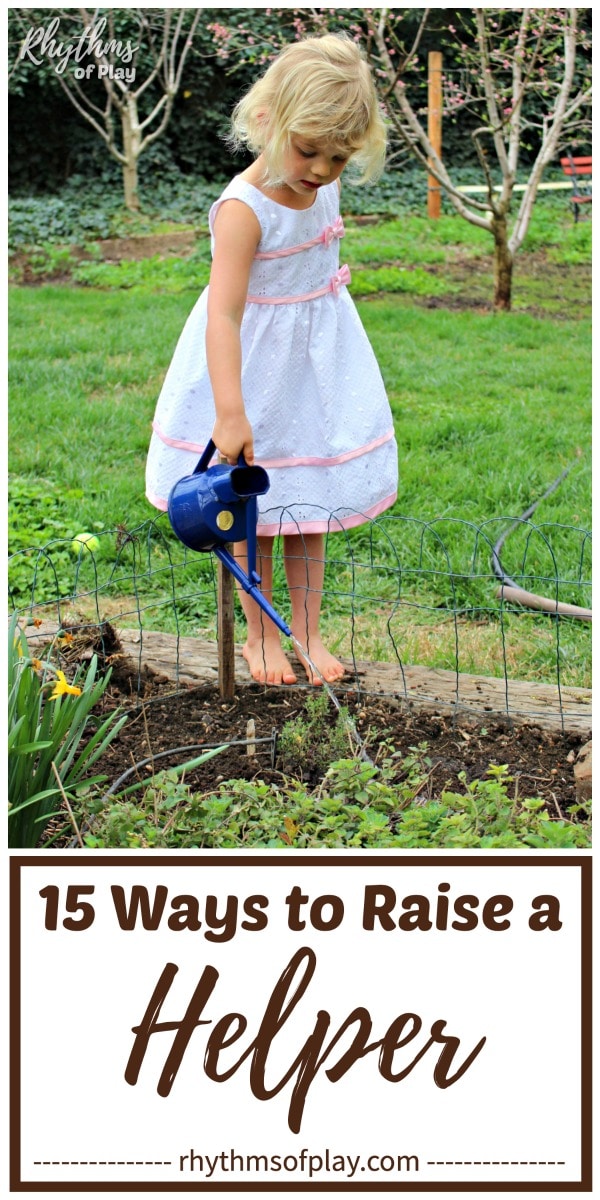
Related: Tools for Raising Helpers
How to Raise Children that Enjoy Helping with chores
In our home, we don’t make our children do chores. Instead, we are helping our kids learn home life skills and habits that they will use to care for themselves for the rest of their lives. We think this is a much-needed shift in perspective that turns children into the helpers they are born to be!
When you raise a helper, you will not need to nag or lecture. Instead, they will learn how to help you. Show them how to follow a simple daily and weekly rhythm that will keep them happily working around the house, yard, and garden, and follow the tips below.
Children need plenty of guidance and instructions from their parents and teachers, and that is why we must encourage and guide them to help from the moment they can walk–so that helping with the chores becomes a well-ingrained habit. Use visual routine cards to help children, toddlers, and adults maintain household rhythms.
When I worked as a nanny and early childhood educator, I discovered that raising a child who helps around the house is just as easy as raising one that doesn’t. Use the list of 15 positive parenting tips below to raise internally motivated children that help you around the house with age-appropriate tasks!
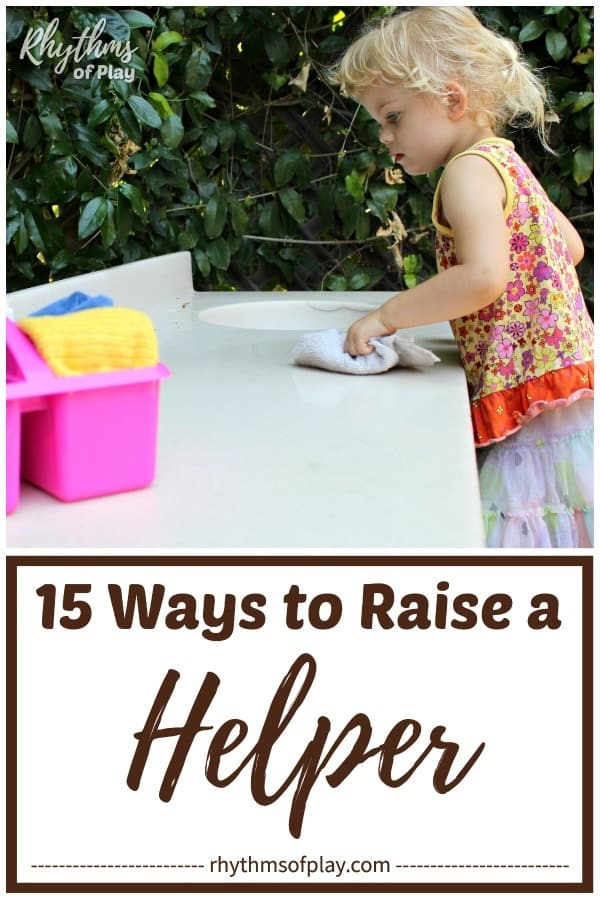
15 Ways to Raise Children that help with Chores And Household Duties
Raise children that will assist you with household chores with the positive parenting tips below.
Related: Teach Children to use Good Manners
1. Position Babies and Toddlers so they can watch you working and doing chores
Children are imitative creatures. That’s a fancy way of saying that they learn everything by watching and imitating the people around them from the time they are born.
In other words, babies and toddlers model the behaviors, actions, and speech that they see and hear. This inborn trait illustrates the importance of doing household chores around babies and toddlers while still young.
I know–it’s a heck of a lot easier to work and get chores done when children are sleeping or gone. But, young children need to see you working and doing chores around the house, or they will not know what to do in the future. It may seem trivial, but I assure you it’s not.
I realized how well this worked as a nanny and early childhood educator. I always needed to do chores in front of the children. Over time I learned that this was perfect and precisely as it should be.
Because before I realized what was happening, the children in my care started helping with the chores. They began to copy what I was doing because of their innate drive to imitate others. It’s natural law. Don’t worry if you haven’t done this yet–start now!
Related: Kids Yoga: Tips for Moms with Newborns to Teens
2. Model How to Do the Task, chore Or Action (and set a Good Example)
Model how to do the task–show your children how to do basic household chores and duties. Children like to watch others and imitate what they see and thus learn best when shown, not lectured, about helping with the chores.
In Waldorf and Montessori education, teachers demonstrate how to do basic actions before asking children to work on a new task. And, the care that they take is evident in their student’s ability to help out at home. So, follow these positive parenting tips, and you will easily do the same.
Related Post: Flower Arranging Montessori Practical Life Activity
3. Complete the action as you would like it to be done
Because children imitate what they see, it is essential to model how to do the chores and duties that you expect them to complete–as you wish it to be done. And, whether you think children are watching or not, make sure you complete the action EXACTLY as you want, every time you do it.
Like it or not, your children will show you how good your example was–or wasn’t. Children don’t know how you meant to do the task or how you wanted to do the chore–they only know what they saw you do.
My daughter often teaches me that I need to improve my example, and sometimes she shows me that I’ve been doing a pretty good job. For the whole story, read How to Raise a Helper.
4. Allow Children to start helping As Soon As they start walking
Your children want to do everything you do. As soon as a child can move around on their own, they can help. They have been watching you their whole life, and they can’t wait to get started. Trust me–it’s all they want to do.
When you allow children to help from the beginning, it becomes a part of who they are. Helping becomes a habit. It becomes their normal–their way of life.
Find simple tasks they can do to help and allow them to imitate you in whatever way they can. When you do this, they love learning and how you raise a helper from birth!
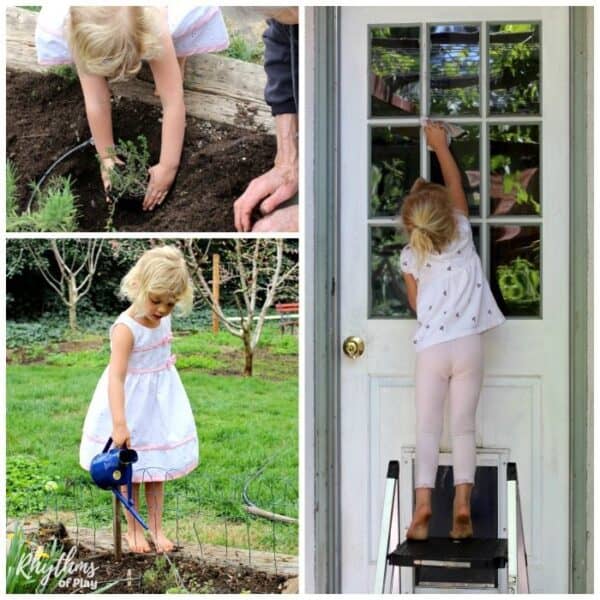
5. Don’t Discourage an EaGer Helper
Whatever you do, don’t discourage an eager worker. It doesn’t take long to teach children that you don’t want them to help. And, if you’re reading this, I’m pretty sure that’s not what you want to teach your children.
But, I’ll be honest. Working with children when they are babies and toddlers and showing them how to assist you can be challenging. It can even be downright painful at times.
I can’t tell you how many times I’ve wanted to get my daughter out of the way so I could get the household chores done. But, of course, there will be times that we cannot include our children. Would you please do your best to handle it gracefully?
Related: The Best Rock Painting Ideas for Kids
6. Invite and allow Or Make an Agreement
While young children do best when we allow them to help, older children need to agree on age-appropriate chores and tasks. So, invite and let young children assist you, but when toddlers or preschoolers are not interested in helping–no problem.
Please don’t push, force, or shame your children. When young children don’t want to help with chores, let them play and come and go as they please. They will eventually find something else to do on their own.
And, they will learn from watching you work, helping with the chores, or figuring out how to entertain themselves. This agreement will create a win, win, win situation. Trust me. You’ve got nothing to lose!
Whatever you do, don’t stop working because toddlers, preschoolers, or kindergarteners don’t want to help. But, on the other hand, please don’t ignore them for hours and hours while you work either. Find the balance, and you can’t go wrong.
Older children will need a bit of guidance, and sometimes a little tough love, to help them learn to complete their duties and honor their agreements. We have created a digital resource to help. Learn more about it HERE–> Home & School Tools for Kids
7. Use kind words
What we say and how we say it matters. Our children want to please us. Watch your language while helping with the chores, and be careful not to bruise their self-esteem with harsh words. It is effortless to discourage a sweet little worker bee. Use kind words and gentle tones as much as possible.
Related: How to Use The Kindness Elves to Encourage Kindness Year Round
8. Guide and encourage your children as they work
Help young children learn to help with the chores by offering your support when needed, but please don’t do their duties for them. Older children will need guidance from you to meet their responsibilities and finish the chores they agree to complete. Do the best you can, and remember to be gentle with yourself and your children.

9. Step in to help only when needed
Unless there is a safety issue, allow your child to struggle and figure things out on their own whenever possible. Don’t help your child complete a chore or task unless they need it.
Each time you do something for a child that they can do for themselves, you limit your child and increase your workload. Instead, allow children to gain mastery by figuring things out on their own.
If you continue to do everything for your child once they can do most things independently, you will teach them that you will always do everything for them. Still worse, you will teach them that you can do everything better than they can.
And, children will continue to allow you to do everything for them when you teach this. Why should they bother trying when you are better at everything and always do it?
Of course, there will be times that you will need to help them with their chores and do things for them. I know I have. We do what we can. The idea is to parent them well enough to look after themselves and help out with household chores and duties, so you don’t have to do it anymore.
Related: Shadow Art Outdoor Science
10. Teach children that mistakes are opportunities to learn
This one has more to do with our example than with our words. We need to show our children how to admit it when we’ve made a mistake, learn from our mistakes, accept our faults, and move on–even when we get upset.
We do this every single day. Our children are watching our every move and mirroring back what they learn. After all, everyone makes mistakes. And, children are often more upset with themselves than you are with them when they “mess up.”
When children make mistakes, they are often afraid that you will be angry with them. So do your best not to scare your children with harsh words and phrases that you can never erase. Instead, teach children that mistakes are opportunities to learn, and challenges can help us grow stronger.
Ask them questions like so:
- What did you learn from this (lesson)?
- How do you think you can do better next time?
- What, if anything, can you do to make it right?
- Do you promise to be more responsible next time?
Related: Books to Help Kids Understand Their Feelings and Emotions
11. Praise their effort not their ability
When praised for their effort, children develop a healthy mindset toward helping with the chores. Here’s why:
- When children are praised for their effort, they are more likely to blame mistakes on a lack of effort as opposed to a lack of ability.
- When children are praised for their ability, they are more likely to feel like a failure and lose the motivation to help when mistakes are made.
Focus on specific examples of effort or accomplishment when offering praise to a child. For example, use phrases such as, “You worked hard to get that window clean.” or “Thank you for helping me sort the laundry. I appreciate the effort you made.”
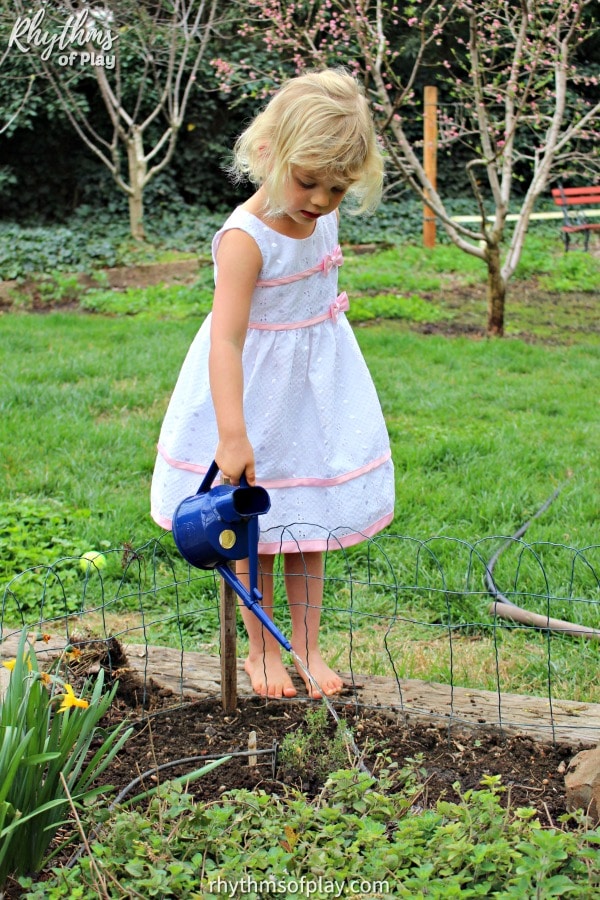
Related: Open-Ended Toys for Pretend Play
12. Don’t re-do anything they did in front of them
Please don’t re-do or “fix” what your child did in front of them. Doing this will make them feel both unworthy and undervalued. Children (and adults) that don’t feel “good enough” are much less likely to help with household chores.
For example, if your child is helping you fold laundry and you don’t like how they did it. Please wait until they are long gone to re-fold it. Praise their effort at the moment and do what you need to do later.
Related: 15 Reasons to Climb a Tree and Other Benefits of Risky Play
13. Offer Practical life activities or Home Life Activities
Think of practical life activities like home economics for little ones. They are designed to provide real-life experiences for children to help them learn how to help with household chores and develop independence.
Dr. Montessori created “Practical Life Exercises” to teach children how to complete activities and household chores done in daily life. She believed that these activities would help children become independent members of the household. In Waldorf education, these activities are called Home Life Activities.
You don’t have to know anything about Montessori or Waldorf education to offer these types of activities to your child. A few options are listed below.
- Cutting a Banana
- Squeezing an Orange
- Flower Arranging
- Sorting Laundry
- Folding Washcloths
14. Establish household rhythms
Children thrive on rhythm in the home. Regular, weekly, and household rhythms help children learn what to expect day by day, month by month. For example, children are more likely to help out around the house when they know what’s coming–especially if they have the tools to help.
If dusting day is Wednesday morning in your home, your kids will know what to expect and be more likely to help–or hide. Either way, you are good to go. You will have eager children helping with the chores or an easy time getting it done on your own.
However, if your children are older and have agreed to help, then you have a bit of work to do. Sometimes children need a little guidance and support when learning to meet their commitments. Lucky for you, we have Visual Routine Cards and Home & School Tools for Kids to help you. Or, learn more about our signature program, Organizing Life with Kids!
Having a regular rhythm is also a great way to make sure we make time for self-care. Motherhood is tough. We can not care for another if we are not caring for ourselves. So put you-time on the weekly schedule. Grab your FREE Weekly Planning Guide to get started. And, use the Dream Life Tool Kit if you’d like even more help. The kids will learn that your time is sacred and give you the time to make it a daily habit.
15. Give them their own tools
If you want kids to help, give them their tools to help with the chores. Tools are magical objects to children. They see us using them, and they want to use them too.
When you give a child a tool, it is as if you are saying, “you are good enough to help, you are valued, and you are worthy.” That is the exact thing that they need, and want, to hear.
So, be sure to have a look at Tools for Raising Helpers for a list of ideas that children are sure to love. Most of the ideas make great gift ideas for Christmas or a birthday.
One of my daughters’ favorite tools is her cleaning kit. We also have a few printable resources for children:
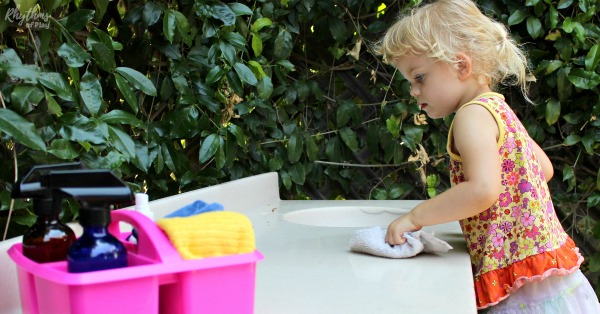
Raise Helpful Children as part of a Complete Education
Raising an internally motivated child is essential to your child’s home education. Homelife is one of childhood’s developmental domains, including language (reading & writing), math, science (STEM & STEAM), art, music, gross motor, fine motor, sensory, and social-emotional learning.
The primary lesson of home life is learning to help around the house and learning to be independent. And, I don’t know a single parent out there who does not want a helpful, internally motivated child.
Help them help you–to help them, become the helper they were born to be! Don’t forget to pop over to have a look at the other articles in this series about raising helpful children:
- How to Raise a Helper
- Tools for Raising Helpers
- How to Use Visual Routine Cards
- Positive Discipline Books for Parents and Educators
And, learn more about Rhythms of Play HERE!
More Positive Parenting Tips and REsources
- Best Parenting Books
- Calm Down Sensory Bottles 101
- 8 Reasons I Allow my Child to go Barefoot
- Kids Yoga: Tips to Get Started
- Kids Books That Teach Important Life Lessons
- Caring for the Earth: 12 Ways to Help Kids Get It
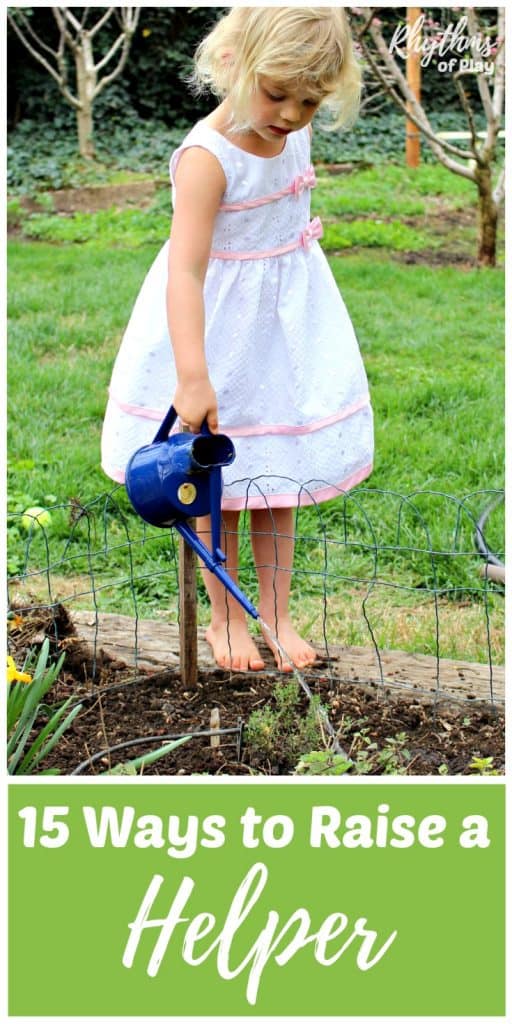







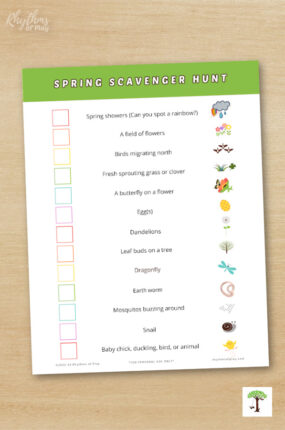

Do you have a handout version of this list? Would love to give this in condensed form to the families I work with but I dont want to just copy your list!
Hi Ali! Thank you for the great idea. I don’t want anyone just copying my list either–lol! I’m making a printable to go with this post and will leave another comment here once it’s done to notify you.
Nell